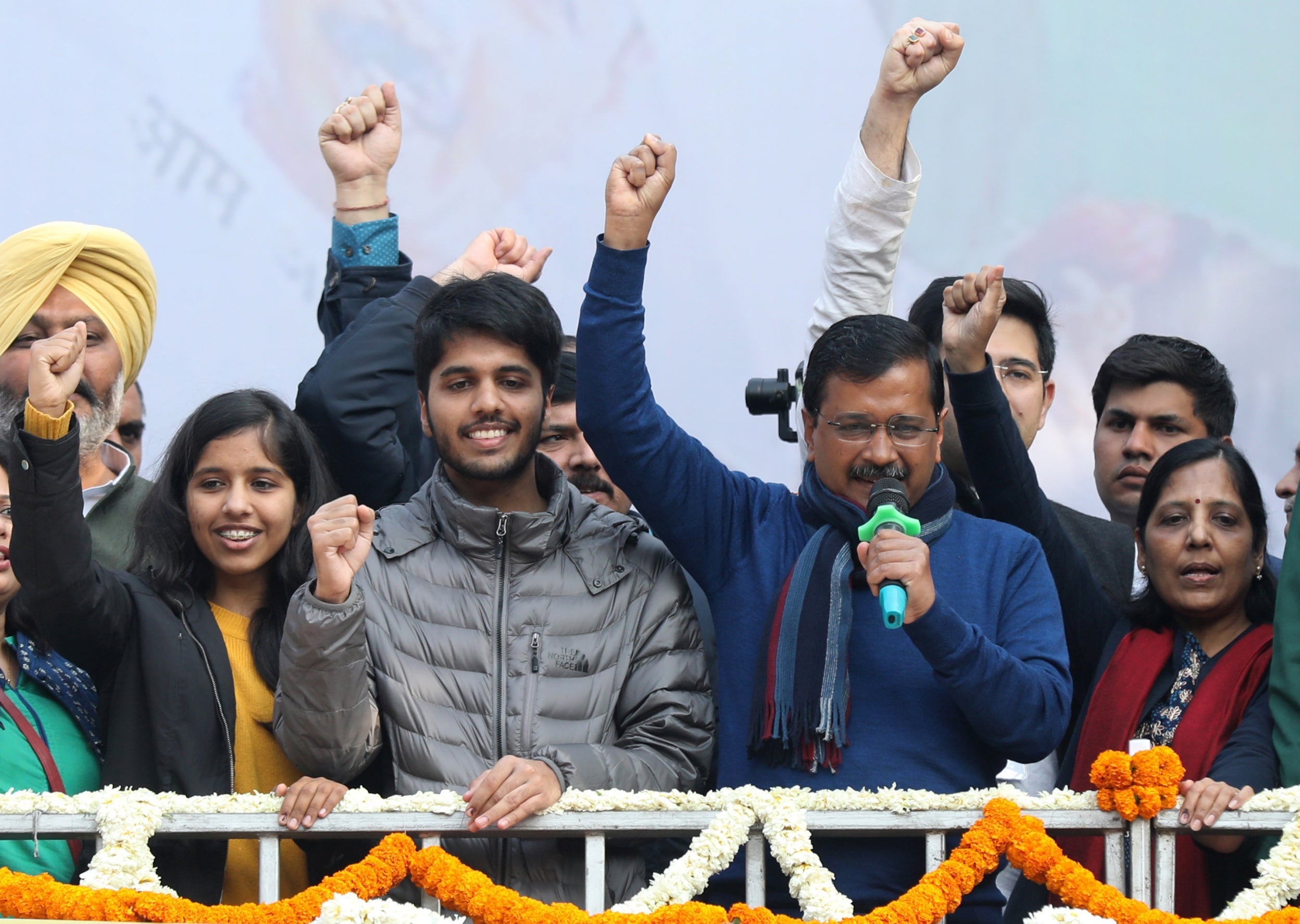Delhi election: Modi’s BJP on course for defeat as Indian capital rejects ‘poisonous’ campaign
After a campaign driven by divisive rhetoric and fought on BJP’s nationalist agenda, city votes instead for incumbent AAP party with anti-corruption message and focus on welfare, Adam Withnall reports


Narendra Modi’s BJP has suffered a resounding defeat in elections for the Delhi assembly, badly losing out to a regional left-wing party despite bringing in some of its star campaigners to rally voters.
With around 80 per cent of the vote counted on Tuesday afternoon, the incumbent Aam Aadmi Party (AAP) was on course to win in 63 of 70 constituencies in the capital, with the BJP taking the other seven.
The expected result means a slightly reduced majority for AAP and its popular leader Arvind Kejriwal, but restricting the BJP to single-digit seats just eight months after Mr Modi won a huge landslide general election victory represents an impressive feat.
“I love you Delhi,” began Mr Kejriwal, in a victory speech addressing supporters. He said the heated election “has given birth to a new brand of politics – a politics of development” meeting people’s basic needs.
Focused on providing welfare to the poor and tackling corruption in politics, AAP was founded in Delhi in 2012 and won a stunning victory in only its second assembly election in 2015. This time around, the party campaigned on its record of providing cheap electricity, free health care, improved public schools and bus transport for women in the capital.
The BJP, on the other hand, deployed national figureheads of the Hindu right, including Mr Modi, home minister Amit Shah and the firebrand cleric Yogi Adityanath to rouse the public with nationalist rhetoric.
The party attempted to make scapegoats out of the protest movement against Mr Modi’s new citizenship law, which excludes Muslims and as a result has sparked rallies across the country in support of India’s secular constitution.
Sit-in protesters in Delhi – mostly Muslim women – were repeatedly described as wanting to split up the country, being in tune with Pakistan or – in the words of one BJP MP – rapists. The main thrust of the BJP campaign was that an AAP government would make such protests more likely.
As the extent of AAP’s victory became clear, the party’s spokesperson Dr Ajoy Kumar said the capital had rejected the “poison” of the BJP’s late star-studded campaign push. “The kind of rhetoric on the ground was worrisome – not in terms of its impact on the election, but more in terms of the hatred and tensions it would lead to on the ground,” he told NDTV.
Sunita Kejriwal, Arvind’s wife, was also celebrating her birthday on Tuesday, and described the result as “the biggest gift I’ve received”. “This is the victory of truth,” she said. “I think politics should be done on the basis of issues. Political parties should learn that such comments [as the BJP’s] shouldn’t be made.”
The BJP – which took every Delhi constituency in the national election last year – conceded defeat, and its national president Jagat Prakash Nadda congratulated Kejriwal, saying the party would “accept the people’s mandate” in the capital and “provide constructive opposition”.
Delhi in fact represents the latest in a string of local election defeats for the BJP. Since December 2018, they have lost power in Madhya Pradesh, Rajasthan, Chhattisgarh, Maharashtra and Jharkhand.
The latest result will represent a worrying trend for Mr Modi and his party, in a country where large amounts of power is devolved to the state level. But there remains, at present, no other single party that comes even close to challenging his personal popularity on a national level.
Neelanjan Sircar, an assistant professor at Ashoka University, said local issues, including the delivery of basic services, appeared to sway voters towards the AAP, even as the BJP ran a polarising campaign on the back of Mr Modi’s image.
“Modi is a larger-than-life character at the national level, which obviously gives the BJP a huge advantage in national politics,” Mr Sircar said.
“But it doesn’t translate to state-level politics, where the BJP often doesn’t have a charismatic face.”
Meanwhile, the Delhi results also show – if more evidence were needed – the perilous state of India’s Congress, the grand old party of Gandhi and Nehru, which once again failed to win a single seat. It’s a dramatic fall from grace for a party that led the Delhi assembly from 1998 to 2013.
The party was crushed at the national level last May, and has struggled to appoint a new leader since Rahul Gandhi’s resignation in the wake of that result. Sonia Gandhi, mother of Rahul and wife of assassinated prime minister Rajiv, was named the party’s interim president in August.
Join our commenting forum
Join thought-provoking conversations, follow other Independent readers and see their replies
Comments